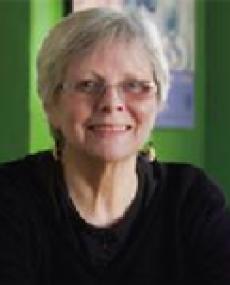
Stephanie Kemp was born in the Karoo in 1941 and grew up with her two sisters in Malmesbury in the Swartland. The town was dominated by the Dutch Reformed Church, and therefore her upbringing was dominated by Afrikaans traditions. Her father who was deeply committed to Afrikaner nationalism arsing from the family's experiences in the South African War, worked as a principal of the Swartland Laerskool. Her cousins were members of the Afrikaner Broederbond. Her mother came from a Methodist missionary tradition.
After completing her matric in Port Elizabeth, Kemp went on to study Physiotherapy at the University of Cape Town (UCT) in 1960. Political turmoil in the country, particularly the Sharpeville Massacre, compelled Kemp to search for a political identity. She joined the Defence and Aid Fund in the Cape where she worked with Dora Alexander, Ray Edwards, Albie Sachs' mother, and Sarah Carneson among others. She was subsequently recruited into the South African Communist Party (SACP). Through her interaction with SACP members and its ideology she became radicalised. Most importantly, through the experience of Cape Town she became resistant to Afrikaans and subsequently refused to speak it anymore.
The Sabotage Act which was promulgated in 1962 sparked protests with students at UCT participating in demonstrations. Kemp participated in a torch demonstration against this Act at Hiddhigh Hall in Cape Town. The Act introduced indefinite detention without trial and vaguely defined terrorism making it unacceptably wide-ranging. As a consequence, Kemp and another student were arrested and detained at Caledon Square police headquarters. They were released shortly afterwards when students threatened to cause more chaos. After this incident, Kemp was recruited into the African Resistance Movement (ARM), an underground sabotage organisation formed by Liberal Party (LP) members who did not agree with the party's insistence on a non - violent response to increasing state repression.
As the government clamped down on the organisation in 1964 arresting several members of ARM, Kemp was also arrested and charged with sabotage. While in detention, she was beaten and tortured until she lost consciousness, in fact she became the first white woman to be assaulted during detention. She was detained at Kroonstad Prison before being transferred to Pretoria Central Prison. During the trial, her lawyers arranged a deal with the state, where Kemp would plead guilty to belonging to an unlawful organisation. Consequently she was sentenced to five years in prison, and three years of the five years were suspended. While she was in detention her lawyers filed a lawsuit against the Minister of Justice and a member of the security branch for assault. The case was settled out of court as the government paid out a settlement without admitting liability.
She was released in December 1965 after spending more than a year and half in prison. Her release followed the intervention of her father who petitioned B.J Vortser for her early release. The following year (1966) she went into exile where she continued her fight against the Apartheid regime by working for the British Anti-Apartheid Movement for three years. This work involved campaigning and mobilising people in Britain and Ireland against apartheid. Kemp spent the rest of her years in exile working underground for the ANC and SACP.In 1966 she married Albie Sachs in London and they had two children (Alan and Michael) together. Kemp and Sachs had met in South Africa while Kemp was on trial. Albie Sachs described her as one of the determined and strong personalities of the ANC in London “working late into the night to decipher and decode massages, and to help the reconstruction of the underground movement in South Africa. It required real commitment, but Stephanie was equal to the task”. Despite working for the ANC in exile, Kemp only officially became member of the ANC in 1969, after the Morogoro Conference resolution to open ANC membership to non-Africans.
In 1980 Kemp and Sachs divorced, and she remained in London working as a paediatric physiotherapist when most of the ANC’s underground work was moved to frontline states. In 1990 the South African President FW de Klerk announced the unbanning of the ANC and other proscribed organisations.
Kemp returned from exile in 1990 and worked as a community physiotherapist in Alexandra for about 7 years before moving to Durban where worked as a lecturer at the University of Durban Westville. Kemp became actively involved in ANC structures in the Johannesburg area. She was elected as the chairperson of the Hillbrow-Berea branch of the ANC. She also served in the provincial working committee of the SACP, and as Gender Co-ordinator for the SACP in KwaZulu-Natal.
After her long service to both of these parties she resigned from both parties in 2008. The crux of her resignation lies in the following statement she made in 2008, that “discussion, debate and Party work, were replaced by a systematic campaign of vilification that became increasingly strident in stirring up hatred toward the National Democratic Revolution (NDR) in general, and the ANC/State President (Mr Thabo Mbeki) in particular”. She became despondent by what she saw as increasing factionalism, mixed with a culture of corruption in the Tripartite Alliance.